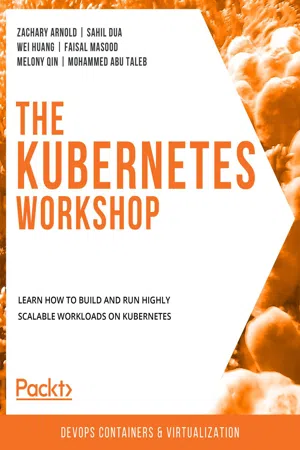
The Kubernetes Workshop
Learn how to build and run highly scalable workloads on Kubernetes
- 780 pages
- English
- ePUB (mobile friendly)
- Available on iOS & Android
The Kubernetes Workshop
Learn how to build and run highly scalable workloads on Kubernetes
About this book
From building your own cluster to running cloud-native applications with Kubernetes, this workshop covers it all using engaging examples and activities
Key Features
- Explore the Kubernetes environment and understand how containers are managed
- Learn how to build, maintain, and deploy cloud-native applications using Kubernetes
- Get to grips with using Kubernetes primitives to manage the life cycle of a full application stack
Book Description
Thanks to its extensive support for managing hundreds of containers that run cloud-native applications, Kubernetes is the most popular open source container orchestration platform that makes cluster management easy. This workshop adopts a practical approach to get you acquainted with the Kubernetes environment and its applications.
Starting with an introduction to the fundamentals of Kubernetes, you'll install and set up your Kubernetes environment. You'll understand how to write YAML files and deploy your first simple web application container using Pod. You'll then assign human-friendly names to Pods, explore various Kubernetes entities and functions, and discover when to use them. As you work through the chapters, this Kubernetes book will show you how you can make full-scale use of Kubernetes by applying a variety of techniques for designing components and deploying clusters. You'll also get to grips with security policies for limiting access to certain functions inside the cluster. Toward the end of the book, you'll get a rundown of Kubernetes advanced features for building your own controller and upgrading to a Kubernetes cluster without downtime.
By the end of this workshop, you'll be able to manage containers and run cloud-based applications efficiently using Kubernetes.
What you will learn
- Get to grips with the fundamentals of Kubernetes and its terminology
- Share or store data in different containers running in the same pod
- Create a container image from an image definition manifest
- Construct a Kubernetes-aware continuous integration (CI) pipeline for deployments
- Attract traffic to your app using Kubernetes ingress
- Build and deploy your own admission controller
Who this book is for
Whether you are new to the world of web programming or are an experienced developer or software engineer looking to use Kubernetes for managing and scaling containerized applications, you'll find this workshop useful. A basic understanding of Docker and containerization is necessary to make the most of this book.
Frequently asked questions
- Essential is ideal for learners and professionals who enjoy exploring a wide range of subjects. Access the Essential Library with 800,000+ trusted titles and best-sellers across business, personal growth, and the humanities. Includes unlimited reading time and Standard Read Aloud voice.
- Complete: Perfect for advanced learners and researchers needing full, unrestricted access. Unlock 1.4M+ books across hundreds of subjects, including academic and specialized titles. The Complete Plan also includes advanced features like Premium Read Aloud and Research Assistant.
Please note we cannot support devices running on iOS 13 and Android 7 or earlier. Learn more about using the app.
Information
1. Introduction to Kubernetes and Containers
Introduction
The Evolution of Software Development
Virtual Machines versus Containers

Table of contents
- The Kubernetes Workshop
- Preface
- 1. Introduction to Kubernetes and Containers
- 2. An Overview of Kubernetes
- 3. kubectl – Kubernetes Command Center
- 4. How to Communicate with Kubernetes (API Server)
- 5. Pods
- 6. Labels and Annotations
- 7. Kubernetes Controllers
- 8. Service Discovery
- 9. Storing and Reading Data on Disk
- 10. ConfigMaps and Secrets
- 11. Build Your Own HA Cluster
- 12. Your Application and HA
- 13. Runtime and Network Security in Kubernetes
- 14. Running Stateful Components in Kubernetes
- 15. Monitoring and Autoscaling in Kubernetes
- 16. Kubernetes Admission Controllers
- 17. Advanced Scheduling in Kubernetes
- 18. Upgrading Your Cluster without Downtime
- 19. Custom Resource Definitions in Kubernetes